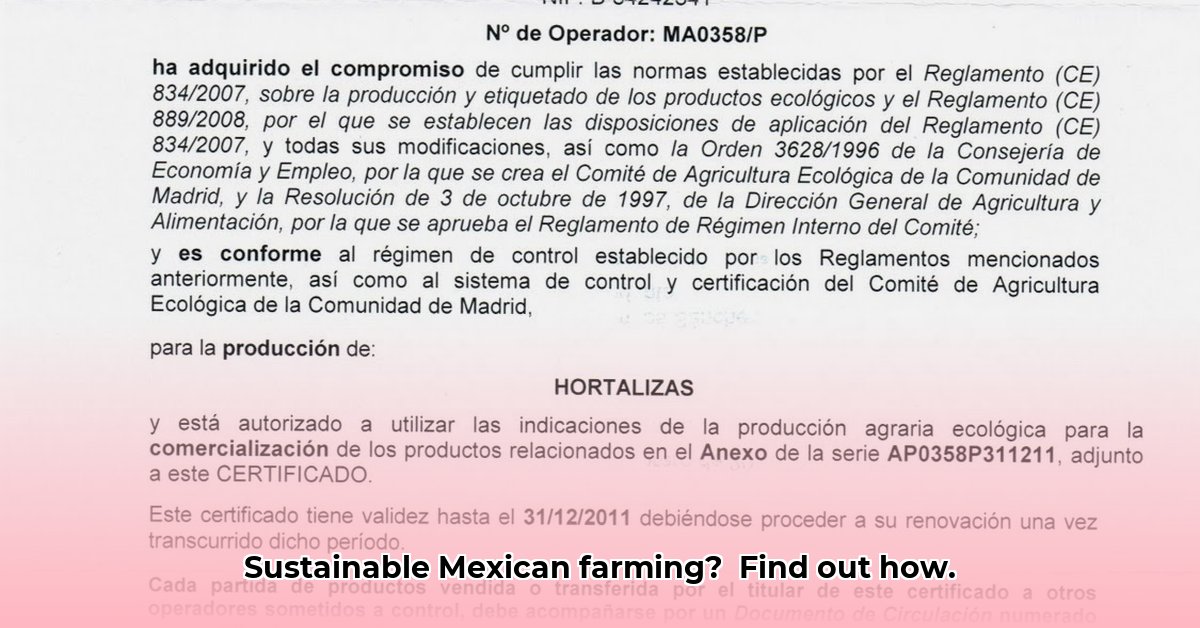
Certificado de Tractores Agricola: Driving Sustainable Farming in Mexico
The certificado de tractores agricola (OCIMA certification) is a crucial element of Mexican agriculture, acting as a quality assurance mark for farm machinery. It guarantees that tractors and other equipment meet national safety and performance standards, fostering trust between buyers and sellers. However, its impact on sustainable agricultural practices requires closer examination. This article analyzes OCIMA's current role, its limitations concerning sustainability, and proposes actionable steps to enhance its contribution to a greener future for Mexican farming. For more on agricultural machinery maintenance, check out this helpful resource: tractor hydraulic fluid.
What is OCIMA Certification?
OCIMA certification is a rigorous process ensuring agricultural machinery meets stringent safety and reliability standards. Before receiving certification, equipment undergoes thorough testing encompassing engine power, braking systems, and other critical components. This rigorous process builds confidence amongst farmers, reducing the risk of equipment failure during critical operations. However, the current framework may not adequately address the increasing demand for environmentally friendly farming practices.
OCIMA and the Environment: A Balancing Act
While OCIMA guarantees safe and functional machinery, its focus on sustainability remains limited. Although emission levels are checked, the certification doesn't comprehensively assess broader environmental impacts, such as long-term fuel efficiency or the environmental footprint of manufacturing components. This presents both a challenge and a significant opportunity for improvement. Integrating stricter environmental standards into the certification process could incentivize manufacturers to prioritize eco-friendly designs, leading to the development of machinery with reduced fuel consumption, lower noise levels, and minimized soil impact.
The Current Situation: A Deeper Dive
Several major manufacturers, such as John Deere, have successfully achieved OCIMA certification, demonstrating the system’s effectiveness in ensuring quality and safety. However, the absence of comprehensive sustainability assessments limits its contribution to environmentally responsible farming. A critical gap exists: the lack of detailed data on the long-term environmental impact of certified equipment. This lack of comprehensive data hampers informed decision-making by farmers. Moreover, OCIMA’s reliance on the Secretariat of Agriculture and Rural Development (SAGARPA) can limit its agility in responding to evolving market demands and technological advancements.
Real-World Examples: Farmers' Perspectives
While OCIMA certification ensures reliable machinery, the impact on sustainability is less clear. A farmer in Jalisco, for example, may experience increased yields with an OCIMA-certified tractor. However, the long-term fuel consumption and the overall environmental footprint of that tractor over its life cycle remain largely unquantified. A comprehensive analysis is needed to determine the full impact of OCIMA certified equipment on the environment.
Who's Involved? A Collaborative Approach
Achieving sustainable agriculture requires a collaborative effort. Farmers need access to information and incentives to promote greener farming methods. Manufacturers must prioritize research and development of eco-friendly machinery. The Mexican government can provide financial support and update regulations. Crucially, OCIMA itself needs to actively integrate sustainability standards into its certification process. Only through collaborative efforts can Mexico hope to reap the full benefits of OCIMA.
Recommendations for a Greener Future
To fully harness the potential of OCIMA, several key steps are necessary:
Enhanced OCIMA Standards: Integrate comprehensive sustainability metrics, such as fuel efficiency, emissions, and lifecycle assessments, into the certification process. This would provide farmers with critical information to make informed choices.
Improved Data Transparency: Publish detailed reports including sustainability data, promoting transparency and accountability. This would empower farmers and stakeholders to make more informed decisions.
Incentivize Sustainable Choices: Offer financial incentives for farmers using certified equipment that meets stringent sustainability standards.
Invest in Research and Development: Increased funding for research and development will further promote innovation in sustainable agricultural machinery.
Looking Ahead: A Sustainable Path Forward
The certificado de tractores agricola holds immense potential for transforming Mexican agriculture. By integrating robust sustainability measures into OCIMA’s certification process, Mexico can empower its farmers to simultaneously improve productivity and safeguard the environment. This requires a commitment to continuous improvement, collaboration, and a shared vision for a sustainable agricultural future. The potential benefits for both the environment and the Mexican economy are substantial.